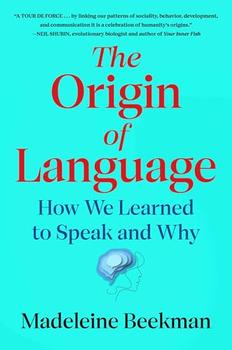
How We Learned to Speak and Why
by Madeleine Beekman
In a radical new story about the birth of our species, The Origin of Language argues that it was not hunting, fighting, or tool-making that forced early humans to speak, but the inescapable need to care for our children.
Journeying to the dawn of Homo sapiens, evolutionary biologist Madeleine Beekman reveals the "happy accidents" hidden in our molecular biology—DNA, chromosomes, and proteins—that led to one of the most fateful events in the history of life on Earth: our giving birth to babies earlier in their development than our hominid cousins the Neanderthals and Denisovans. Faced with highly dependent infants requiring years of nurturing and protection, early human communities needed to cooperate and coordinate, and it was this unprecedented need for communication that triggered the creation of human language—and changed everything.
Infused with cutting-edge science, sharp humor, and insights into the history of biology and its luminaries, Beekman weaves a narrative that's both enlightening and entertaining. Challenging the traditional theories of male luminaries like Chomksy, Pinker, and Harari, she invites us into the intricate world of molecular biology and its ancient secrets. The Origin of Language is a tour de force by a brilliant biologist on how a culture of cooperation and care have shaped our existence.
"The Origin of Language is a tour de force. At its core it seeks to explain the origin of language. But, by linking our patterns of sociality, behavior, development, and communication it is a celebration of humanity's origins. Reading Madeleine Beekman's book, you will never look at babies—and their utterances—the same way ever again." —Neil Shubin, evolutionary biologist and author of Your Inner Fish
This information about The Origin of Language was first featured
in "The BookBrowse Review" - BookBrowse's membership magazine, and in our weekly "Publishing This Week" newsletter. Publication information is for the USA, and (unless stated otherwise) represents the first print edition. The reviews are necessarily limited to those that were available to us ahead of publication. If you are the publisher or author and feel that they do not properly reflect the range of media opinion now available, send us a message with the mainstream reviews that you would like to see added.
Any "Author Information" displayed below reflects the author's biography at the time this particular book was published.
Madeleine Beekman is professor of evolutionary biology and behavioral ecology emerita at the University of Sydney, Australia, Editor-in-Chief of Insectes Sociaux, and board member of the Philosophical Transactions of the Royal Society, Biological Sciences. Madeleine Beekman lives in Australia's northern tropical rainforest with her husband where she can observe cassowaries from her office. She has two adult daughters.
Your guide toexceptional books
BookBrowse seeks out and recommends the best in contemporary fiction and nonfiction—books that not only engage and entertain but also deepen our understanding of ourselves and the world around us.